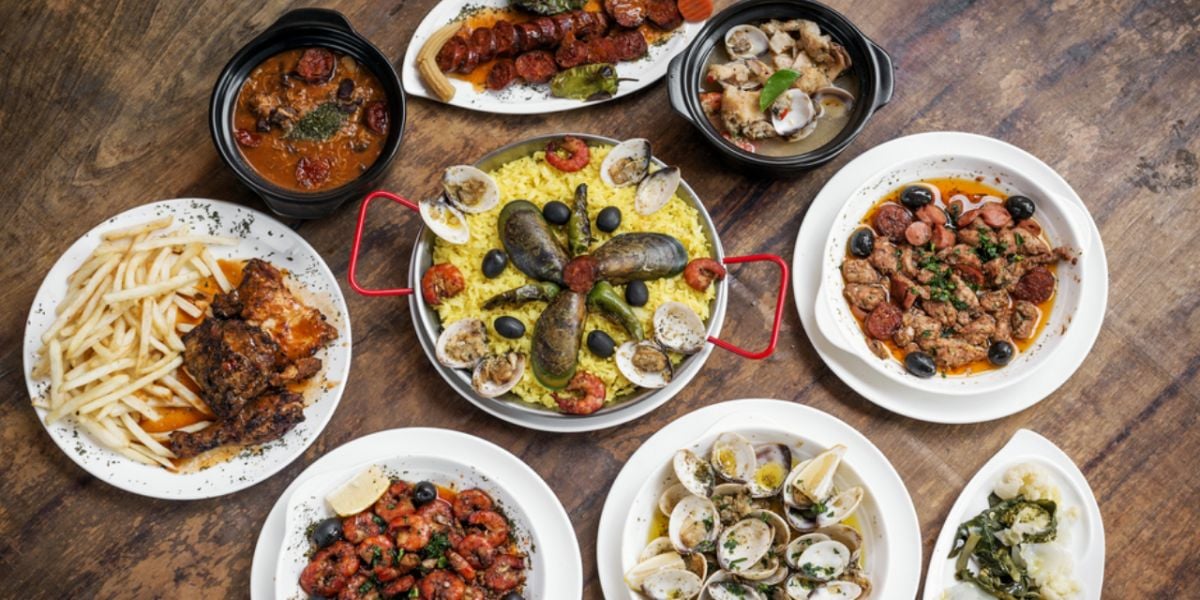
Madrid´s culinary scene has something for everyone. The city is home to traditional Spanish cuisine, regional dishes from across the country, and a variety of international restaurants. Whatever your preferences, you're sure to find something to suit your taste.
Good to know:
Expats may find Madrid's dining schedule very different from what they're used to. Read a bit more about eating and meal times before setting out on your culinary adventures in Madrid.
Food scene in Madrid
One of the highlights of the food scene in Madrid is its tapas culture. Tapas are small plates of delicious food meant to be shared amongst friends while enjoying a round of drinks. From traditional options like patatas bravas (crispy fried potatoes with a spicy tomato sauce) and jamón ibérico (cured ham) to more innovative creations, there's an almost endless variety of options.
For those looking to indulge in a hearty meal, Madrid is home to numerous traditional restaurants. Here, you can savor classic dishes, such as cocido madrileño (a stew made with chickpeas, vegetables and various types of meat) and rabo de toro (oxtail stewed in red wine), which are sure to leave you longing for more.
If you're searching for modern and innovative gastronomic experiences, the Spanish capital boasts several Michelin-star restaurants that push the boundaries of flavor and presentation. These establishments elevate Spanish cuisine to new levels, offering creative dishes combining traditional flavors and innovative techniques.
Popular dishes in Madrid
When it comes to Madrid's most popular dishes, every local will have their own view of what's best and where to get it. However, there are a few dishes that are a must while in Madrid.
Bocadillo de calamares is a traditional sandwich made up of a long, white roll stuffed with fried rings of squid. It's a common snack or lunch item and is found in the traditional bars and cafes that ring Plaza Mayor.
Cochinillo, or suckling pig, is a delicacy in Madrid, though it originates from nearby Segovia. It's slow-cooked over several hours, leaving the skin crispy and the meat very tender. One of the places you can get suckling pig is Casa Botín, which is the oldest restaurant in the world according to the Guinness Book of Records.
Churros are a favorite among locals and visitors alike. These fried dough sticks are a go-to for breakfast or a snack and are served with a steaming cup or pot of hot chocolate for dipping. You'll find plenty of churrerías all over the city. One of the most famous is Chocolatería San Ginés in the city's center
Huevos rotos, or broken eggs, is a plate of chips topped with fried eggs and either Spanish ham (jamón) or sausage (chorizo). Make sure you cut the eggs so the runny yolk drizzles over the chips. Many bars serve huevos rotos, but Casa Lucio is one of the most popular for this Madrid classic.
Tortilla (Spanish omelet) is a simple dish of egg and thinly sliced potato. While it sounds simple, every restaurant does it their way. Casa de la Tortilla is a great choice for the traditional version, while Pez Tortilla offers modern twists on this classic dish.
Best restaurants in Madrid
If you're looking for traditional dining in Madrid, you won't be disappointed. Eateries with fixed menus can be found in just about every Madrid neighborhood. For something upscale, try Celso y Manolo, a trendy tapas restaurant, or Fismuler for regionally inspired cuisines.
For many foodies, the Michelin Guide is a go-to list to find incredible restaurants with high-quality and exciting cuisines. If you like fine dining, Madrid has numerous Michelin-starred restaurants to amuse your palate, including the whimsical and creative three-star DiverXO.
Food markets in Madrid are must-visit spots for anyone seeking exciting flavors. Mercado de San Miguel, a beautiful glass-walled market, is popular with tourists and offers flavors from every part of the country—for example, cheeses from the Basque Country and fresh seafood from Galicia. Other popular spots include Mercado Barceló and Mercado de San Antón.
If you want a break from Spanish food, Madrid's international dining scene has you covered. A couple of highlights are the Indian and North African restaurants in the Lavapiés district and Malasaña neighborhood for its Middle Eastern and Mexican cuisines.
Useful links:
Michelin Guide restaurants Madrid
Food and Drink | Official tourism website
Gourmet Markets and Gastronomic Spaces | Official tourism website (esmadrid.com)
We do our best to provide accurate and up to date information. However, if you have noticed any inaccuracies in this article, please let us know in the comments section below.








